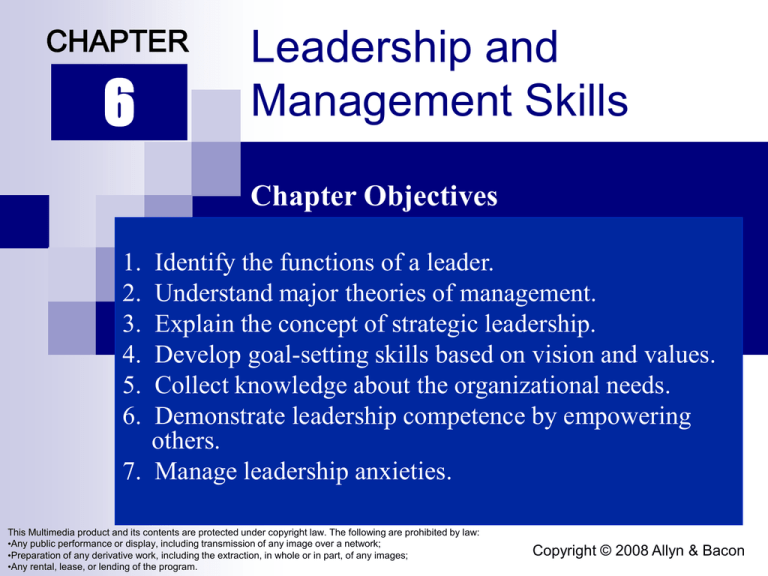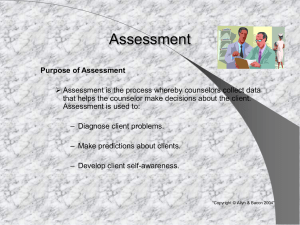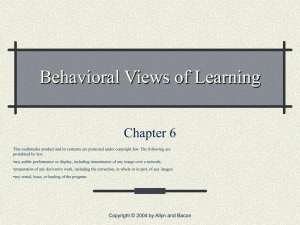Chapter 6
advertisement

CHAPTER 6 Leadership and Management Skills Chapter Objectives 1. 2. 3. 4. 5. 6. Identify the functions of a leader. Understand major theories of management. Explain the concept of strategic leadership. Develop goal-setting skills based on vision and values. Collect knowledge about the organizational needs. Demonstrate leadership competence by empowering others. 7. Manage leadership anxieties. This Multimedia product and its contents are protected under copyright law. The following are prohibited by law: •Any public performance or display, including transmission of any image over a network; •Preparation of any derivative work, including the extraction, in whole or in part, of any images; •Any rental, lease, or lending of the program. Copyright © 2008 Allyn & Bacon Four Functions of Management Planning: set goals and outline steps to reach goals Organizing: accumulate and coordinate resources Motivating: generate commitment and support Controlling: use authority and power to ensure plan Copyright © 2008 Allyn & Bacon Leadership Skills Technical Skills Ability to use data, information, technology, and other innovations. Human Skills Ability to work with people to accomplish goals. Copyright © 2008 Allyn & Bacon Managers and Leaders Copyright © 2008 Allyn & Bacon Copyright © 2008 Allyn & Bacon Copyright © 2008 Allyn & Bacon Kuhnert and Lewis’s Leadership Theories Transactional Leadership Theory Based on exchanges for mutual gain Works if each party has something the other wants Transformational Leadership Theory Reaching goals through appeals to deep-seated values The leader inspires others by example Leader has a talent for motivating others Copyright © 2008 Allyn & Bacon Leadership Behaviors Include: Influencing others to achieve a goal Motivating the organization toward change Affecting individuals behavior through noncoercive means Expressing interpersonal influence through the communication process Identifying a vision for the organization Copyright © 2008 Allyn & Bacon Goal Setting For Leadership Shared Values Higher levels of company loyalty Clarity Establish clear organizational values Consensus Seek agreement with stated values Copyright © 2008 Allyn & Bacon Developing Vision Leaders identify new goals and new ways to achieve them. Leaders clearly articulate the vision and behave in ways that consistently reflect it. Leaders create a vision that serves as a guide and inspiration for followers. Copyright © 2008 Allyn & Bacon Managing Change in Organizations Four Step Strategy: • Anticipate the problems that are likely to occur when the vision is implemented. • Focus the organization on the vision. • Look at results rather than at processes (both leaders and employees). • Build a strong, supportive, network of people committed to change. Copyright © 2008 Allyn & Bacon Situational Knowledge: The Foundation of Strategic Leadership Knowledge About Self Self-concept development (know your strengths and weaknesses Avoid hubris (excessive pride) Organizational Knowledge Continual learning (analyze and learn from past and present) Four tasks in response to failure: Review\Assess\Predict\Resolve Copyright © 2008 Allyn & Bacon Demonstrating Leadership Skills Critical elements of communication are: Building trust Trust must be earned. Mutual trust between followers and leaders is needed. Leaders are role models of ethical behavior. Promoting understanding Empowering others Copyright © 2008 Allyn & Bacon Ethical Leadership Principles Always be truthful. Obey the law. Demonstrate trust in other people. Act consistently when dealing with others. Remove corrupting influences from the workplace. Look for the good in others. Review organization’s code of ethics often. Openly celebrate organization’s values. Listen to others with an empathic ear. Call attention to unethical behavior. Give credit where it is due. Publicize instances of high ethical behavior. Copyright © 2008 Allyn & Bacon Ethical Leadership Principles Sustain trust. Address problems of mistrust. Understanding begins with attending to what employees are saying. Include coworkers in discussions of problems. Encourage individual thinking. Encourage subordinates to communicate upwardly. Follow through on these ideas. Reward those who offer advice. Copyright © 2008 Allyn & Bacon Empowerment Entrusting people with the authority to act independently Promotes creativity, cooperation, and inspiration Everyone feels like they make a difference Reduces status differences Rewards creativity and team building Copyright © 2008 Allyn & Bacon Anxiety Management For Leaders Optimism Persistence Passion Accepting Responsibility for Failure Copyright © 2008 Allyn & Bacon Copyright © 2008 Allyn & Bacon











